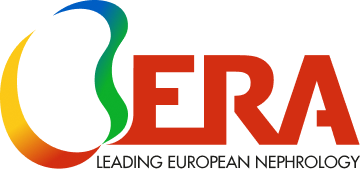Monoclonal gammopathy of unknown significance in kidney transplanted patients
About the project
A collaboration between ERA and the National Societies of Nephrology in Europe

The Cookbook project
This project was created to actively involve the National Societies in a project under the umbrella of ERA.
The aim of this project is to give nephrology patients and their caretakers recipes that are patient-friendly from different countries around Europe and Countries bordering Europe and the Mediterranean Sea.
This is a project that is “alive” meaning that new recipes can be added at any time, furthermore in the future, the project can expand to allow comments from patients, and suggestions thus making it a lively “forum” for this essential daily need.
We are very grateful to the committee members that have so actively contributed to the scientific introduction as well as to all the National Societies who have so willingly shared (and will continue to share) their special recipes with all of us.
Finally, we would like to point out that the content of the recipes is of the authors who have submitted them and that in no way ERA is responsible or liable and that, furthermore, these recipes do not in any way substitute the guidelines provided to every single patient by their physician.
Acknowledgements
The initiatives of ERA would not be possible without the hard work of many volunteers.
We are grateful to all the Nephrology Cookbook Committee Members who have contributed to the “scientific introduction” and, in particular, to Christoph Wanner and Philippe Chauveau for their leadership and coordination efforts.
The ERA Working Group ERN – European Renal Nutrition gave its endorsement and actively contributed to this initiative.
EDTNA/ERCA has also actively supported the initiative.
A special thanks go to Felicity Kimber who coordinated this introduction from a secretarial point of view. Last, but by no means least, the support of the National Societies of Nephrology for submitting the recipes: without their support, this project would not have been possible!
Discover other recipes here:Planetary Health Recipes – EAT
Committees Members
Philippe Chauveau, France
Lina Johansson, United Kingdom
Catherine Lasseur, France
KalliopiAnna Poulia, Greece
Siren Sezer, Turkey
Stanislas Trolonge, France
Christoph Wanner, Germany
Glossary of terms
These definitions will give an understanding of the concepts
Aetiology: cause or causes behind a disease/ the study of the causes relating to disease.
Anaemia: a condition in which there is a deficiency of red cells or of haemoglobin in the blood, resulting in pallor and extreme fatigue.
Anuria: when the kidneys stop producing urine.
Asthenia: extreme loss of strength or energy.
Atheroma: build-up of fatty deposits in the inner layer of the arteries.
Atherosclerosis: disease in which plaque builds up in the arteries, resulting in the narrowing of the vessels.
Peritoneal Dialysis (PD): a type of dialysis that uses the peritoneum in a person’s abdomen as the membrane through which fluid and dissolved substances are exchanged with the blood.
Chronic Kidney Disease (CKD): a disease where kidney function gradually decreases over months or years.
Diabetes (Diabetes mellitus): A disease that occurs when your blood glucose is too high.
Erythropoietin (EPO): a hormone, produced by the kidneys, that stimulates the production of red blood cells.
Glycosylated haemoglobin: Glycated haemoglobin (or HbA1c) is a form of haemoglobin that is bound to glucose. It helps to identify a three-month average of blood glucose concentration. It serves as a diagnostic test, and for glycaemic control.
Haemoglobin: protein in red blood cells that combines with oxygen to carry it around the body.
Hypercholesterolaemia: abnormally high levels of cholesterol in the blood.
Hyperglycaemia: excess level of plasma glucose level.
Hyperkalaemia: high level of potassium in the blood.
Hyperlipidemia: a higher level of plasma lipids. It could be associated with a higher risk of Atherosclerosis.
Hypertension: also known as high blood pressure.
Hypertensive: a person who suffers from high blood pressure.
Hyperuricemia: an elevated level of uric acid in the blood.
Normotensive: blood pressure level is normal.
Oedema: a build-up of fluids in the body tissues. This can affect a part of or the entire body.
Parathyroid hormone (PTH): is made by the parathyroid gland and helps to regulate the levels of calcium produced by the body.
Proteinuria: means that there are excess amounts of protein in the urine.
Synthesis of fatty acids endogenously (known as de novo lipogenesis, or DNL,) is a metabolic pathway for changing dietary carbohydrates (CHO) into fat.
References
J Ren Nutr. 2021 Feb 25:S1051-2276(20)30288-0.
Pace RC, Kirk J. Academy of Nutrition and Dietetics and National Kidney Foundation: Revised 2020 Standards of Practice and Standards of Professional Performance for Registered Dietitian Nutritionists (Competent, Proficient, and Expert) in Nephrology Nutrition
